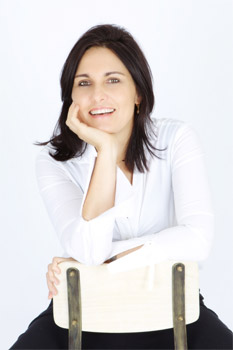Dr Linda Friedland Stress Reduction Interview

Dr Linda Friedland Stress Reduction Interview
An international health professional, medical doctor, author and keynote speaker with more than 20 years experience in the field of clinical medicine and 15 years of consulting and advisory to leading global companies, Dr Friedland is a well-regarded international speaker and a best-selling author of five books. She is an authority on executive and corporate health, stress management and performance. With a background of 20 years in clinical medicine combined with strategy expertise and governance, Friedland consults internationally to healthcare, corporate and financial institutions. She has developed and implemented numerous health, lifestyle and illness prevention programs for corporations through Asia, USA, Australia, Africa and the UK. She has presented at more than 1000 business events throughout 30 countries as one of the highest rated international speakers reaching at least 250 000 attendees and clients.
She is also a Graduate of the Australian Institute of Company Directors (GAICD). Dr Friedland is married to Professor Peter Friedland and resides in Perth Western Australia (since 2009).
For more about Dr Linda Friedland, visit www.lindafriedland.com
Question: Can you talk us through how stress affects our energy?
Dr Linda Friedland: Stress is simply the release of adrenalin in our body. Short bursts of stress are in fact good for us. Good -stress' is motivating and allows us to engage and perform well. The problem for most of us is that we remain in a continuous 'switched on" state with adrenalin and also cortisol (another stress hormone) pumping often day and night. We don't have sufficient periods of recovery – when the adrenalin is turned off. This intense state is a huge drain on our energy and causes our fatigue, exhaustion and often burn out.
Question: What are your top five ways to turbo charge our energy?
Dr Linda Friedland: Make sleep your number one priority.
Sleep is undoubtedly the most powerful restorative tool
Manage energy rather than time
Time is finite, but energy can be expanded and regularly renewed. By eating nourishing super-foods, hydrating and taking mini power breaks.
Interrupt your day
Use short periods in your day to recharge energy. Take a breath and push your -pause' button for a few moments every 90 minutes
Switch off adrenalin with exercise
Use your lunch break to get to the gym, go for a run or take a brisk walk out of the office. The work -out and then the post exercise switch-off of adrenalin facilitates energy recovery and renewal
Go for a regular massage
Massage is a tremendously effective method of reducing the stress hormones adrenalin and cortisol
 Question: How can we easily keep work from stressing us out?
Question: How can we easily keep work from stressing us out? Dr Linda Friedland: There is no -easy' way or quick fix to keep work from stressing us. What is simple however is the decision to do things differently. Ensure you structure some time to defuse your stress and to recharge your energy. Although it often seems impossible, with discipline and planning you can ensure you take mini breaks during your work day. Keep well hydrated, exercise moderately and eat nourishing superfoods. Develop a healthy sleep strategy too. Furthermore…know when to stop! Your time outside of the office should be spent on you and the people you care about.
Question: Why do you believe sugar is the 'new nicotine"?
Dr Linda Friedland: Sugar is a highly addictive foodstuff. A rush of sugar into your blood causes a spike in your insulin levels, which pushes the glucose into your cells, thereby plummeting your blood glucose levels once again. This plunge leaves you fatigued, moody and craving more sugar. You are never satisfied and continually seek more highs. This vicious cycle of peaks and troughs may be a precursor to diabetes. Too much sugar in the blood simply gets stored as excess fat. This is also laid down in the lining of vessels putting you at risk for heart disease and stroke.
Question: What advantages does coffee have on our health?
Dr Linda Friedland: At last there is some good news for the millions of coffee lovers worldwide: coffee in moderation is possibly harmless and more so may provide significant health benefits. It contains more antioxidants than cocoa and as many as those found in blueberries. Recent studies have shown that coffee consumption may reduce the risk of many illnesses, including Alzheimer's, cancer, heart disease, diabetes, and liver disease. The recommended benefits extend to a maximum of about three cups a day. Although coffee may have benefits, heavy caffeine intake in the order of five to six cups a day can cause restlessness, anxiety, irritability and sleeplessness.
Question: Can you tell us about your books?
Dr Linda Friedland: My first 3 books (SELF, Having it all & Ultimate Guide to Women's Health) were all on women's health and lifestyle and work life balance. The fourth book was on family health (Ultimate Guide to Family Health). These were all bestsellers. The latest one on parenting (Raising Competent Teens in an age of porn, drugs and tattoos) was published by Rockpool Publishing 2015 in Australia.
Question: What are your top five tips to work/life balance?
Dr Linda Friedland: If you're searching for "work/life balance" you'll always be disappointed. The reason you may feel so frustrated much of the time, is that the balance you are hoping for, just doesn't exist. Most of life is filled with hard work. The key is in being super-disciplined in establishing sufficient recovery time and maximising your time off. Think more of work-life integration, in that work and personal life should be allies. You can achieve a greater sense of harmony by reclaiming control over some of your lifestyle choices, maximizing your time off and ensuring you recharge your battery regularly.
Recover intermittently
Respect your biological clock (There are peaks of naturally high energy and troughs of low energy and it is impossible to fight this innate human natural rhythm)
When you leave work……leave work
No awards for being superhuman
Reclaim control over your life.
Question: Why is hours of inactivity at a desk making us unwell?
Dr Linda Friedland: Sitting itself is an independent risk factor for disease apart from too little exercise. As soon as we sit down, electrical activity in our leg muscles shuts off. That muscular activity is so important for most of the body's metabolic processes including clearing of blood glucose and fat. When we sit for long hours, we reduce the blood flow throughout the whole body. The data suggests that beyond six hours the risk rises dramatically for every extra hour. Yet for most of us, sitting for up to eight or ten hours a day is inevitable.
Interview by Brooke Hunter
MORE



